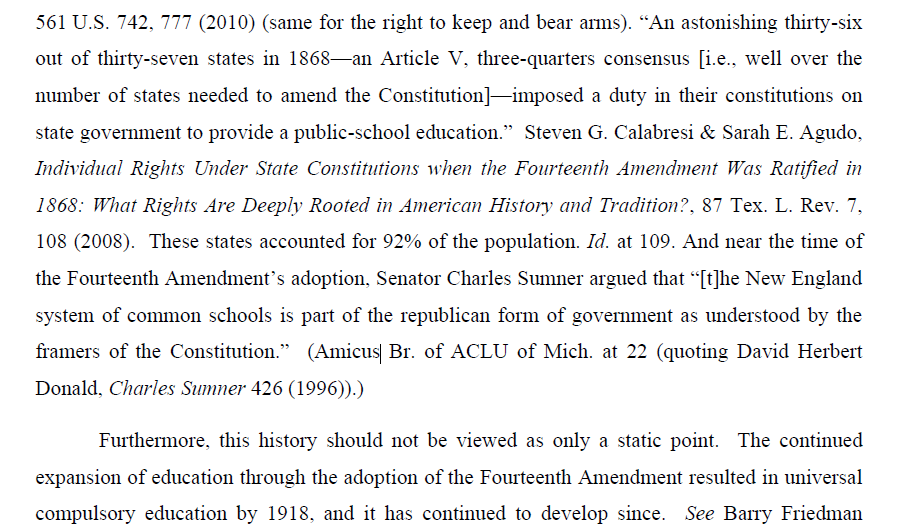HUGE. The Sixth Circuit Court of appeals has confirmed that students have a basic right literacy under the U.S. Constitution—and that Detroit children have plausibly alleged they were denied that right.
I’m beyond proud to have filed a brief for the @CityofDetroit in this case.
I’m beyond proud to have filed a brief for the @CityofDetroit in this case.
Because the opinion isn& #39;t yet available online, I& #39;ll provide the legal breakdown: the court held that "a basic minimum education" is a fundamental right protected by the 14th Amendment.
It relies on a substantive due process theory, rather than an equal-protection theory. /2
It relies on a substantive due process theory, rather than an equal-protection theory. /2
For non-lawyers, here& #39;s the distinction. A "due-process" theory means that a "basic minimum education" has to be provided to EVERYONE.
An "equal protection" theory means that, if the state& #39;s providing an education, it can& #39;t just deny SOME students a basic minimum education. /3
An "equal protection" theory means that, if the state& #39;s providing an education, it can& #39;t just deny SOME students a basic minimum education. /3
Both theories were strong. Conditions in Detroit schools were abhorrent--& conditions elsewhere in Michigan weren& #39;t.
We argued both a due-process & equal-protection theory in our brief, & I wrote an op-ed for @nytimes in support of equal protection. /4 https://www.nytimes.com/2019/11/07/opinion/detroit-public-schools.html">https://www.nytimes.com/2019/11/0...
We argued both a due-process & equal-protection theory in our brief, & I wrote an op-ed for @nytimes in support of equal protection. /4 https://www.nytimes.com/2019/11/07/opinion/detroit-public-schools.html">https://www.nytimes.com/2019/11/0...
But importantly: the court doesn& #39;t reject the equal-protection claim as a LEGAL matter.
In fact, it affirms what the Supreme Court has previously said: that "a discrete group" of children cannot be denied a basic education without a "substantial state interest." /5
In fact, it affirms what the Supreme Court has previously said: that "a discrete group" of children cannot be denied a basic education without a "substantial state interest." /5
On equal-protection, the 6th Circuit said the children who are suing need to specifically allege HOW Detroit kids are being treated differently than others in the state.
If this case goes back to the district court, the court will have discretion to let them make that claim. /6
If this case goes back to the district court, the court will have discretion to let them make that claim. /6
So, legally, this is a good ruling on both an equal-protection & due-process theory.
It says that a state can& #39;t maintain a horrifically unequal education system. And--more importantly--it says a "basic minimum education" can& #39;t be denied at all. /7
It says that a state can& #39;t maintain a horrifically unequal education system. And--more importantly--it says a "basic minimum education" can& #39;t be denied at all. /7
Moving to "due process": the court held that access to a basic minimum education is fundamental because it has an "extensive historical legacy," & because participation in democracy is impossible without literacy. /8

 Read on Twitter
Read on Twitter






